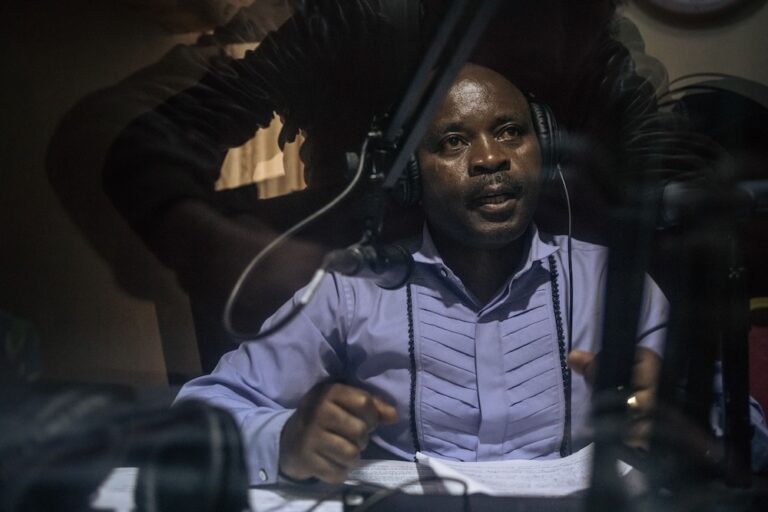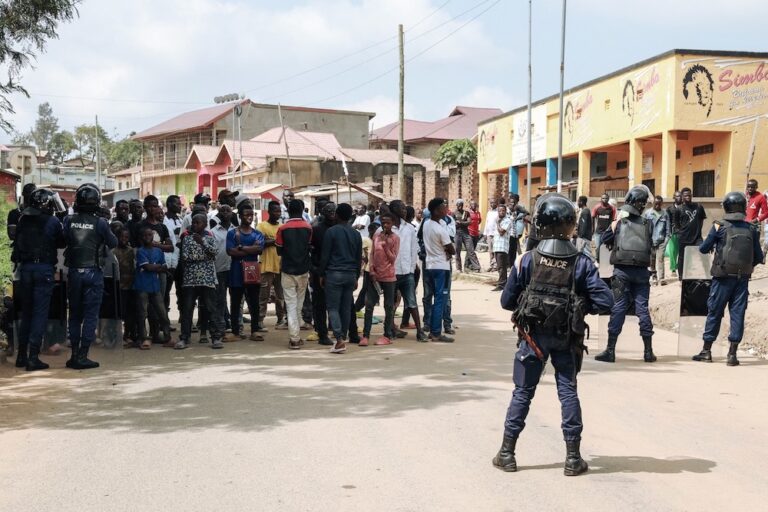(JED/IFEX) – JED has reviewed the the conclusions of the commission of inquiry into the assassination of former president Laurent-Désiré Kabila, as reported by newspapers published on Thursday 24 May 2001 in Kinshasa. The commission chair, Attorney General Luhonge Kabinda Ngoy, released the commission’s conclusions on 23 May in Kinshasa. The commission was initially launched […]
(JED/IFEX) – JED has reviewed the the conclusions of the commission of inquiry into the assassination of former president Laurent-Désiré Kabila, as reported by newspapers published on Thursday 24 May 2001 in Kinshasa. The commission chair, Attorney General Luhonge Kabinda Ngoy, released the commission’s conclusions on 23 May in Kinshasa. The commission was initially launched on 16 February by the head of state.
Having analysed the press summaries of the commission’s conclusions, and based on the public’s right to freedom of information, as guaranteed by Article 19 of the Universal Declaration of Human Rights and Article 19 of the International Covenant on Civil and Political Rights, texts which the Democratic Republic of Congo (DRC) has signed, JED is issuing the following observations:
1. The government’s commission of inquiry brought very little new information forward beyond that which had already been the subject of rumours. The commission did not answer the key question of who had an interest and who benefited from Kabila’s death. There is no explanation for this gap when one considers that the commission’s work extended over close to four months at Congolese taxpayers’ expense.
1.1. The commission’s inquiry report remains ambiguous concerning certain key areas, such as the date and place of death of President Kabila. The commission attests that Kabila was killed after being shot three times. He reportedly received “a bullet in the temple, which went through his head,” and another that “went through [his] heart.” However, at the same time, the report supports the government’s hypothesis that the former president died two days after the attack, on 18 January.
1.2. The commission confirms that the former head of state’s presumed assassin, a soldier named Rachidi Mizele, was killed immediately after the crime, but does not reveal the identity of the person who killed Rachidi, nor who benefited from his disappearance.
1.3. Whereas, according to the commission, Rachidi was killed just after his crime, probably within the presidential palace, it is surprising that the weapon used in the crime was never recovered.
1.4. The commission states that the Lebanese citizens who were summarily executed following Kabila’s assassination “participated in the plot” and their elimination was part of the assassins’ desire to make evidence of the crime disappear. However, it does not offer any clues concerning the persons who had an interest in seeing these Lebanese citizens disappear. Nor is any information offered regarding the Lebanese citizens’ alleged role in the conspiracy.
2. The commission hides behind the principle of presumption of innocence to explain why it does not mention the names of the persons and countries implicated in Kabila’s assassination. At the same time, it makes no such attempt to hide the names of Bizima Karaha, Adolphe Onosumba, Joseph Mudumbi and other Ruberwa, all of whom are members of the rebel movement Congolese Rally for Democracy (Rassemblement congolais pour la démocratie, RCD). It also names countries like Uganda and Rwanda, which support the rebellion.
2.1. The commission believes that the task of clarifying these matters further rests with the Congolese justice system, as such negating its very raison d’être and the vast powers put at its disposal, which it used to detain and incarcerate about 100 suspects, who remain imprisoned at present.
3. Whereas the commission of inquiry’s conclusions were submitted to President Joseph Kabila on 20 April, it is curious that the president only authorised the report’s publication over one month later.
JED reminds the government, courts and tribunals that information is not their personal property, but rather that they are only the guardians acting on the people’s behalf. As such, “in no circumstance should the concern to avoid embarrassing the authorities or conceal their wrongful behaviour serve as a justification” for the non-disclosure of information.
JED asks the government, courts and tribunals to do everything in their power to ensure that the principle of maximum disclosure is put into practice and to release all the information concerning the circumstances surrounding Kabila’s death.


